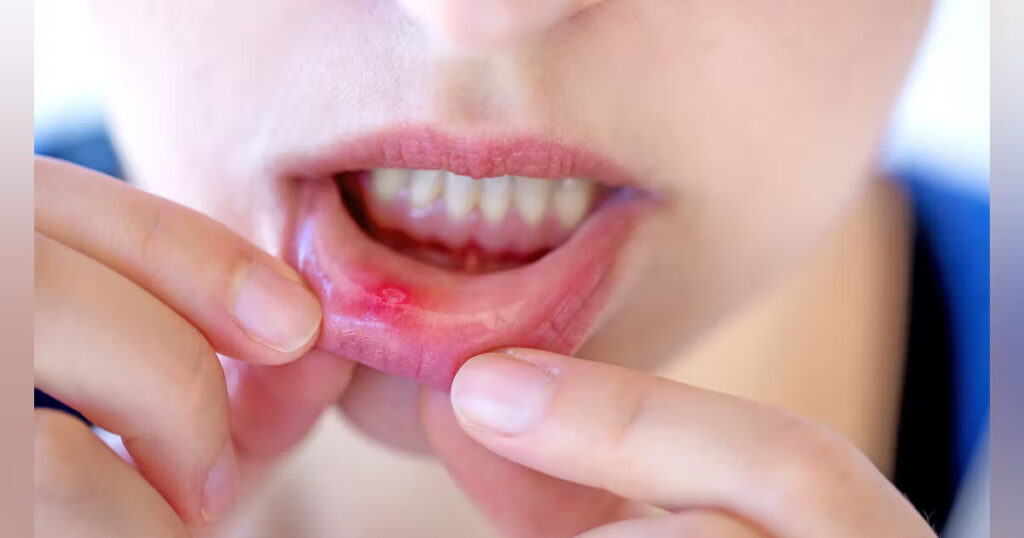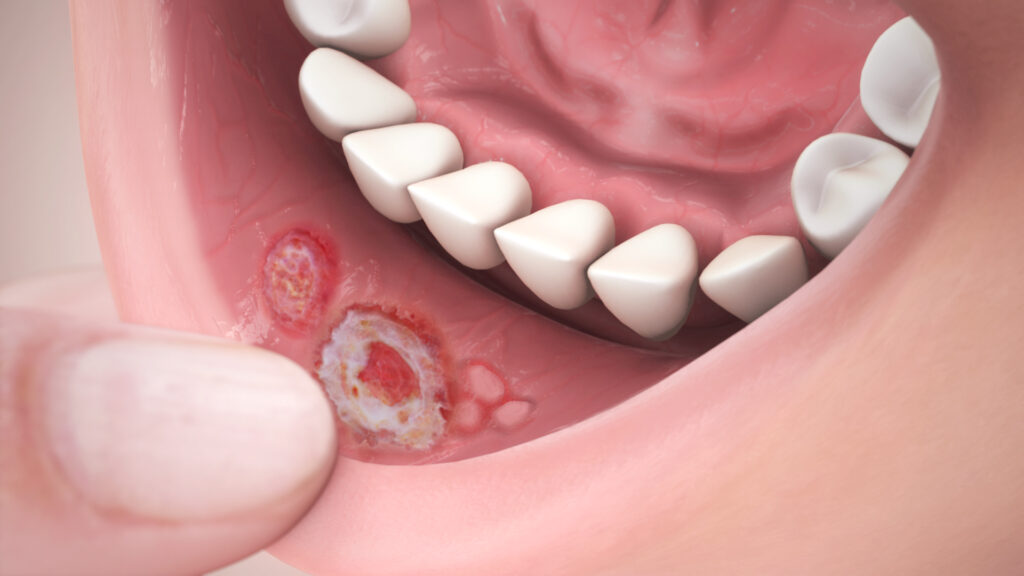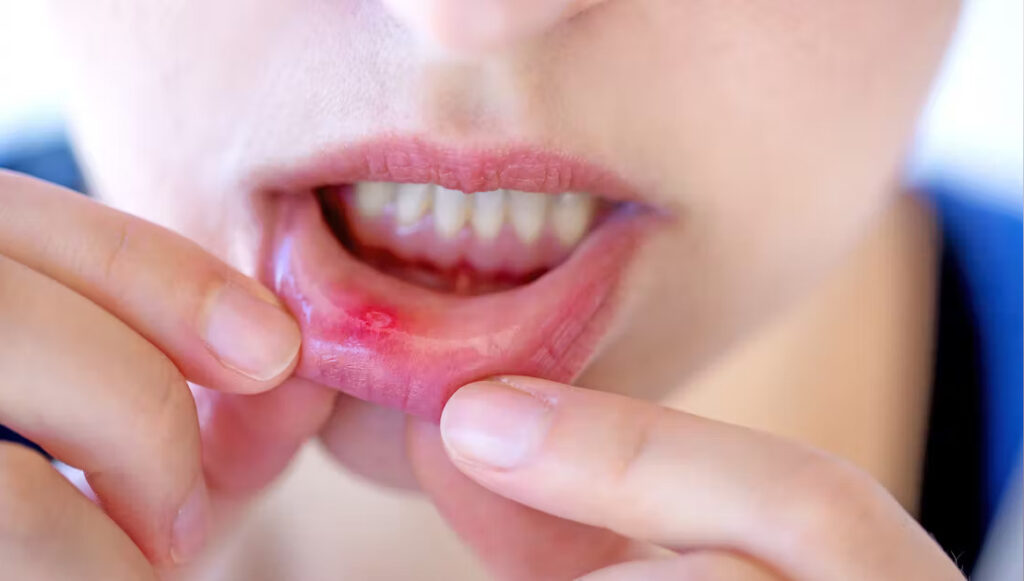
The removal of your wisdom teeth, also known as the third molars, is a common dental procedure that millions of young adults undergo each year. Having your wisdom teeth removed can be a painful and tedious experience. After the procedure, it is normal for patients to experience pain, swelling, and tenderness in the surgical site.
While most are prepared for the expected discomfort, an unexpected guest often shows up uninvited – the canker sore. These small, painful lesions can be a source of frustration for those who are already dealing with the pain and swelling that comes after the surgery.
But why do these canker sore happen after the wisdom teeth removal surgery, and how do we deal with them effectively?
In the rest of this article, we will shed light on the causes of canker sores and offer tips on managing the pain that comes with it, as well as preventing the pesky sore. Whether you are planning to have your wisdom teeth removed or are already in the recovery period, this article will provide you with all the information you need to get smiling wide again!
What is Canker Sore?
Canker sore, known medically as aphthous ulcer, is a small and painful sore that develops on the inside of the mouth. These sores are typically circular or oval-shaped and have a white or yellow center with a red border. They are usually very small (approximately 2 milimeter) but can grow as much as 1 inch in diameter.
Canker sore affects people of all ages and can appear almost anywhere in the mouth, including the gums, tongue, cheeks, or lips. However, unlike cold sores, canker sores are not contagious at all.
Canker sores can be quite painful, especially when you’re eating, drinking, or talking. They typically occur in three stages:
- Prodromal stage: Before a canker sore appears, you might experience a burning or tingling sensation in the area.
- Ulcer stage: This is when the sore itself becomes visible. It appears as a white or yellow oval with a red border.
- Healing stage: Over time, the sore will gradually heal on its own and disappear. This process typically takes one to two weeks depending on the condition of the individual
According to MedicalNewsToday, as much as 20% of the global population get canker sore at least once in their lifetime. Yet, in spite of their prevalence, little is known about the true cause of it. However, researchers suggest that canker sores are primarily due to a weakened immune system. Some causes suggested include:
- Stress,
- Hormonal change
- Spicy, salty, or citrus food
- Food allergies
- Poor nutrition
- A deficiency in iron and/or vitamin B-12
- Early stage of oral cancer
- Smoking
- Trauma to the mouth
People who had their wisdom teeth removed are at a significantly higher chance of developing canker sore due to the stress and laceration that the dental procedure has caused.
What Are the Types of Canker Sores?
There are several types of canker sore and it is important to know the type that you are suffering from in order to apply the right treatment plans
Minor canker sores are the most common type of canker sore and are usually small (approximately 2 to 5 millimeters) and round. They typically appear on the inside of the lips and cheeks but heal within a week or two without requiring any medical treatment or causing scarring.
Major canker sore are the larger (approximately 10 millimeters) and deeper version of minor canker sores. They tend to be more painful and are less defined than minor canker sores due to its size. Major canker sores can appear on the soft palate or tonsils and may require medical treatment, such as prescription medications or topical ointments. In many cases, a major canker sore can leave a scar after healing.

Herpetiform canker sores are the least common and most painful type of sore as they appear in a cluster of small, pinsire sores to form one large sore. Similar to minor canker sore, they appear on the inside of the lips and cheeks and take up to two weeks to heal without scarring. In spite of its name, herpetiform canker sore are not caused by the herpes virus infection.
It is worthy to note that while most sores appear in their form, there can be variations in the presentation and severity of canker sores from person to person.
What Is the Difference Between Canker Sore and Cold Sores?

Canker sores and cold sores are two different types of sores that can appear in or around the mouth. Here are the differences that you need to know between the two:
- Cause: Canker sores are not contagious and are not caused by a virus. Cold sores, on the other hand, are caused by the herpes simplex virus (HSV), specifically the HSV-1 strain.
- Appearance: Canker sores are small, round with a red border. Cold sores are clusters of small, fluid-filled blisters that burst and form a crust. It can be itchy and painful to the touch.
- Location: Cold sore can appear on the nose, chin or cheeks whereas canker sores are only found on the inside of the mouth
- Contagiousness: Canker sores are not contagious and cannot be spread from person to person. Cold sores, on the other hand, are highly contagious and can be spread through close contact, such as kissing or sharing of items like utensils or towels.
- Treatment: Canker sores usually heal on their own within a week or two. Over-the-counter topical products and mouth rinses can provide some symptom relief. However, cold sores must be treated with antiviral creams or oral medications to reduce the symptoms and shorten the duration and frequency of the outbreak. Due to its contagious nature, people who suffer from cold sore must start treatment as soon as possible to prevent spreading it.
As explained, canker sores and cold sores are two completely different conditions that require different treatments. If you’re unsure whether you have a canker sore or a cold sore, it’s best to consult with a healthcare provider or dentist for a proper diagnosis and treatment recommendations.
You may be interested in: Does Flossing Actually Whiten Your Teeth?
How to Treat Canker Sores After Wisdom Teeth Removal?
Treatment of canker sores after wisdom teeth removal involves managing the discomfort and promoting the healing process. Here are the different solutions that you can try to relieve the pain and speed up the healing process:
- Rinse your mouth with saltwater: Mix one teaspoon of salt into a glass of warm water and swish the solution around your mouth for 30 seconds before spitting it out. This isotonic solution helps to kill any bacteria and accelerate the healing of your tissue. Repeat this several times a day, especially after meals.
- Take over-the-counter pain relievers: Nonsteroidal anti-inflammatory drugs (NSAIDs) like ibuprofen or acetaminophen can help to manage pain and reduce the inflammation.
- Apply over-the-counter topical treatments: Over-the-counter topical treatments such as benzocaine or numbing gels can provide instant pain relief and promote healing of the canker sore. Apply the treatment directly to the canker sore using a cotton swab. Do not use your finger as you may risk infecting the sore if your fingers are unclean.
- Apply a damp tea bag to the sore: This natural remedy involves damping a new or used tea bag with warm water and applying it directly on the sore for a few minutes. Tea contains tannins, which have anti-inflammatory properties and can help to soothe the sore.
- Undergo cautery procedure. This painful process involves the use of an instrument or chemical substance to cauterize (burn) the canker sore. This destroys the damaged tissue and reduces the healing time to a matter of days. This medical procedure should only be done by a medical professional at a clinic as it can worsen the sore if improperly administered.
Remember, each person’s mouth heals at a different pace, and what works best for you might differ from what works for someone else. If the canker sore is particularly large, lasts more than three weeks, seems to be spreading, or is excessively painful, consult your dentist immediately as it is signs of something more serious.
How to Prevent Canker Sores?
While it may not be possible to prevent canker sores entirely, there are measures that you can take to reduce their occurrence or minimize their severity.
- Follow post-operative instructions: These instructions typically include guidelines for oral hygiene, diet, and medication usage. Adhering to these instructions can minimize the risk of complications, including canker sores.
- Maintain good oral hygiene: Regular brushing and flossing can keep your mouth clean and reduce the chances of getting canker sores. Use a soft-bristle toothbrush to prevent irritating your mouth and a mild, alcohol-free mouthwash to rinse your mouth after brushing.
- Avoid irritating foods: Spicy foods, acidic foods, and sharp or crunchy foods can irritate the mouth and trigger canker sores in some people. If you notice a pattern between consuming certain foods and the appearance of canker sores, try to limit or avoid these foods.
- Manage your stress: High stress levels can trigger canker sores in some people. Techniques such as meditation, yoga, deep breathing, regular exercise, and getting enough sleep can help manage stress levels.
- Don’t damage your mouth: Accidental bites, sharp tooth edges, or poorly fitted dentures can damage the inside of your mouth and lead to canker sores. That said, this is unavoidable if you are undergo wisdom teeth removal surgery and suffer from trauma (e.g burn from dental drill) during the procedure.
- Avoid tobacco and alcohol: Both tobacco and alcohol can irritate the delicate tissues in your mouth and hinder the healing process. Refrain from smoking or using tobacco products, and limit or avoid alcohol consumption during the healing period.
- Watch out for vitamin deficiencies: Deficiencies in certain vitamins and minerals, particularly B-12, zinc, folate, and iron, have been associated with canker sores.
- Avoid known allergens: If you have any known allergies, particularly to certain types of food, avoiding these allergens can prevent associated canker sores.
- Stick to a soft diet: Adhere to soft, bland foods like yogurt, mashed potatoes, or smoothies until the sore has healed. This is also recommended after your wisdom teeth removal surgery to prevent irritating your surgical site.
Takeaway
In conclusion, dealing with canker sores following wisdom teeth removal can be an additional challenge in the recovery process. These small but painful sores can cause significant discomfort, but it’s important to remember that they’re usually temporary and often heal on their own within a week or two.
Following your dentist’s instructions, maintaining good oral hygiene, avoiding foods that can irritate your mouth, and managing stress are key factors in both treating and preventing canker sores. Even though the exact cause of canker sores is not known, these proactive steps can help minimize their impact and help you recover more comfortably after the removal of your wisdom teeth.
Remember, every individual’s experience with wisdom teeth removal is unique. The most important thing is to listen to your body and seek professional advice when needed. This will not only help you deal with canker sores more effectively but also ensure a smoother and safer recovery from your surgery.







